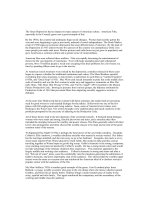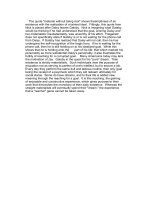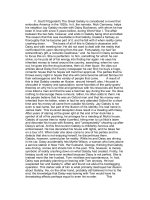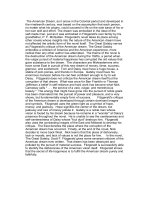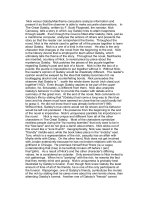the great gatsby
Bạn đang xem bản rút gọn của tài liệu. Xem và tải ngay bản đầy đủ của tài liệu tại đây (35.02 KB, 3 trang )
Brian Olson
OLSON 1Professor John HughesENC 1102December 3, 1996Life, like
The great Gatsby Imagine that you live in the nineteen twenties, and
that you are a very wealthy manthat lives by himself in a manchine, on a
lake and who throws parties every weekend. Thisis just the beginning of
how to explain the way Jay Gatsby lived his life. This novel, by F.Scott,
Fitzgerald is one that is very deep in thought. Fitzgerald releases little
clues alongthe way of the novel that will be crusual to understand the
ending. For instance, hemakes the blue coupe a very important clue, as
well as the Dr. T. J. Eckleburg eyes on thebillboard that Mr. Wilson (the
gas station attendant ) refers to as the eyes of god. Thereare also other
little things that relate to the reason of gatsby's death. The
maincharacter's of this novel each have their part to do with the ending,
Nick Caraway isprobably the main character of this novel, as he comes
down from New Jersey to newYork to visit his cousin Daisy, who is
married to Tom Buchannan. These are some of theincidents that are
included in the novel as you will read further I will relate some issues
ofthe novel, as well as other critics have included their views on The
Great Gatsby. F. Scott, Fitsgerald was an American short story
writer and novelist famous forhis depictions of the Jazz Age(the 1920's),
his most brilliant novel work being The GreatGatsby(1925). He was born
in St. Paul, Minnesota on sept. 24, 1896 and died inHollywood, California
on December 21, 1940. His private life, with his wife, Zelda, inboth
America and France, became almost as celebrated as his novels.
Fitsgerald was theonly son of an aristocrat father, who was the author of
the star spangle banner. Fitzgeraldspent most of time with his wife, latter
in their relationship they moved to france where hebegan to write his most
brilliant novel, The Great Gatsby. All of his divided nature is inthis novel,
the native midwestener afir with the possibilities of every Americans
dream in
OLSON 2it's
hero, Jay Gatsby, and the compassionate princeton gentlemen in it's
narrator, NickCarraway. The Great Gatsby is the most profoundly
American novel of it's time(Houghton). Fitzgerald had an intensely
romantic imagination, what he once called "aheightened sensitivity to the
promises of life," and he rushed into experience determined torealize
those promises. Latter on in Fitzgeralds life, he started to drink very
heavily andbecame very unhappy. In 1930 his wife had a mental
breakdown and in 1932 another,from which she never recovered. With
it's failure and his despair over Zelda, Fitzgeraldwas close to becoming
an incurable alcoholic. He surpassed becoming an alcoholicthough, and
moved out west to become a Hollywood screenwriter were he met his
newwife Sheilah Graham, but he never forgot about Zelda and his
daughter Scotti.(Johnson, 384). The Great Gatsby is an excellent
review on how fitzgerald preceived his life to be,in the same sense that
he also was very wealthy. Gatsby, in this novel is the mistirieswealthy
man that lives in the big house across the lake from Tom and Daisy
Buchanann. There would always be some type of party going on at his
house, but for some reason henever attended to them, he would always
watch from his window. Nick Caraway isDaisy's cousin who comes to
visit, Nick needs a place to stay, so he finds an ad for aguest cottage that
Mr. Jay Gatsby owns. After Nick has moved in Jay and Nick
becomepretty close friends. Jordan has always wondered who The
Great Gatsby was, so sheuses Nick to find out more about him. As the
story goes on, there are some odd thingsthat Fitsgerald relates to the
story as important things. These important things make youreally think
about what it means to the story. The Automobile in The Great Gatsby is
avery big topic for the conclution of the story. What we have in The Great
Gatsby is acreative manipulation of the automobile as symbol and image
to accomplish a variety ofends (O'Meara, 74). O'Meara goes on to say
that when Fitzgerald accentuatesmechanism and minimizes aesthetics,
he depersonalizes vehicles and underscores the
OLSON 3behavior of their drivers.
The existing criticism on automobiles in The Great Gatsbyusually centers
on one or the other of these two functions.(O'Meara, 75). The result ofthe
car is that it ends up killing Myrtle. Kenneth and Irving Saposnik discuss
theautomobile imagery from a technological standpoint. Knodt asserts
that all of the novel symbol's of technology - automobiles, trains, and
telephones are connected withdestruction and evil (Saposnik, 131). I
believe in this theory, that vehicles are a result evilin almost every movie.
In this case the evil is the Blue Coupe sedan that ends up killingMyrtle.
The other thing that sticks out to me is the billboard that has the two eyes
on itwith glasses. This board is referred to Mr. Wilson as the eyes of god,
he believes that theycan see everything and when the car ends up killing
his wife Myrtle, he tells people thatgod saw what happened. A footnote
for the line in Andrew Turnnbull's edition of TheLetters of F. Scott
Fitzgerald(1963)describes the dust jacket as showing "two huge
eyes,intended to be those of Daisy Fay, brooding over New York City,
and this had beenFitsgerald 's inspiration for the eyes of Dr. T. J.
Eckleburg"(Turnbull, 166). The brief exegesis examines the
imagery of cats and dogs in Scott Fitzgerald's jazzage novel, The Great
Gatsby. Toward the end of the novel, Nick Caraway refers to thehot
summer days on Long Island as "dog-days"(Kehul, 118). John Kehul
goes on tomention that many of the characters in the novel are portrayed
in canine terms. Theycynically, in the sense of the Greek root kynikos,
meaning "dog-like." Their 'bites,"particularly in relationship to the main
character, Gatsby, become worse then their"barks." In contrast to this
canine element, Gatsby has a "heightened sensitivity"(120). In The Great
Gatsby I did notice a lot of the characters mentioning dogs or phrasing
oneanother as "you old dog you,". Myrtle mentions to Tom (the man she
is having an affairwith) that she would like a dog. I believe that Fitzgerald
resembles these dogs as a symbolof affection. Canine imagery first
appears in chapter one, when Nick casually tells thereader that he once
owned a dog. He lists his possessions: an old dodge, a finish woman
OLSON 4who
cooks and cleans for him, and his dog. "I had a dog at least I had him a
few daysuntil he ran away(124). Almost forty years after the book was
written, ErnestHemmingway recalls Fitzgerald giving him a copy of The
Great Gatsby: It had a garishdust jacket and I remember being
embarrassed by the violence, bad taste and slippery lookof it. It looked
like the book jacket for a book of bad science fiction. Scott told me not
tobe put of by it, that it had to with a billboard along the highway in Long
Island that wasimportant in the story. He said that he liked the jacket,
but now how didn't like it. I tookit offto read the book (feast 176).
According to Hemmingway, the cover of the bookonly "had to do with" the
billboard and had already fallen out of favor with theauthor(179). I believe
that the cover of The Great Gatsby is a unique one, in a way thatpeople
really would believe things like that if they never had any type of
religionbackground or were just messed up in the head. As I was
explaining earlier in the paper about all the characters, I was
mentioningthings about Nick Carraway. Nick Carraway is also the
narrator of the novel, he isprobably they most sufficient character in the
novel, meaning that he is always relayinginformation to others rather than
getting involved in the mischief. What I mean is, that,the affairs between
Tom and Myrtle, and Daisy and Gatsby. Nick knows just abouteverything
about everyone and he is the newest person in town. I think that
Fitzgerald putlike this because, Nick had no other meaning to the story if
he didn't get involved withthe secrets that were going on. Near the end
though, Nick is clueless as to what is goingon with Myrtle and Tom until
the night of the accident when Myrtle runs out in front ofthe speeding
yellow cadilac. Myrtle had thought that Tom was driving the car, and so
she dashed in front of it because she wanted to leave with Tom and get
away from herhusband that was not to rich or smart like Tom was. In
The Great Gatsby, the fact thatthe billboard is only mentioned once or
twice in the film, but it so crucial to how the resultof the ending is.
Fitzgerald is trying to point out that this billboard is the point were
OLSON
5everything takes place, like, the eyes looking down on the two cars
going to party and thatthey are always looking at Mr. Wilson. When Mr.
Wilson's wife (Myrtle) dies he is shockand is looking for answers to what
happened. As O'Meara points out earlier, cars are ameans of
destruction and evil. In two cases this is true. One, being that big yellow
cadilackilled Myrtle and two, the fact Tom is using his car as a medium of
exchange for Mr.Wilson's wife and free gas. Mr. Wilson does not relize
the fact that his wife is cheatingon him with Tom, the man he wants the
car from. In all conclusion to The Great Gatsby, many little things in
the novel weresubstantial to how the ending was to be. Fitzgerald had
really related the billboard of Dr.T. J. Eckleburg that looked like owl eyes
and referred to a the eyes of god by Mr. Wilsonwhen he talking to Tom.
The other thing that sets the tone of this novel is the car. thiswas the
murder weapon that killed Myrtle and was recognized by Mr. Wilson as
the carthat Jay Gatsby was driving that night, which was result of the
death of Mr. Jay Gatsby byno other than the man that looked at the "owl
eyes " all day outside his gas station. Wellthe fact of living in the
nineteen twenties and being a millionaire and throwing partiesevery
weekend doesn't sound that bad, I just wouldn't want to be The Great
Gatsby.


